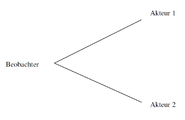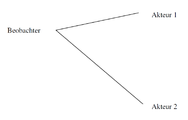Power of interpretation
Power of interpretation is a critical concept of normative social sciences and the sociology of science . This is intended to encourage the self-criticism of protagonists in these disciplines, i. H. of representatives z. B. the psychological subjects (psychiatry, psychology, psychosomatics and psychoanalysis) are challenged especially with regard to the social prestige they claim . This self-criticism appears necessary to safeguard the emancipatory interest that is inherent in these subjects. With the help of this concept it should be checked whether the work done and its methods serve the social target group, e.g. B. the mentally ill and their health and not primarily their own social prestige or other personal advantages, e.g. B. the group narcissism of the respective representatives of these sciences. It is therefore a question of method validation and evaluation of these sciences.
Explanation
- Conflict symmetry according to Herman Schmid
If the power of interpretation represents a form of exercise of power , then the particular form of this exercise of power results from the power of definition . If the power of definition is negotiated in non-violent discourse between those affected, it is democratically unobjectionable, but if it has conflicting features or if it is carried out by an observer from asymmetrical perspectives or if it proves to be dependent on socially different roles between those affected, it fulfills that of an independent one Observers did not expect social science requirements. This results in z. B. Special points of criticism from different socio-medical and medical-sociological perspectives, for example with regard to the definition monopoly of the medical profession as a professional professional group with considerable legal influence on questions of medical assessment in the sense of a socio-political mandate . In contrast, the legal position and influence of self-help organizations of affected patients can be viewed as asymmetrical. Issues related to medical law assessments, especially in the psychological subjects, are largely to be understood as legal interpretations and thus as subjects of interpretative power (→ forensic psychiatry ).
Some problematic examples
- Power of interpretation in constitutional law
- Power of interpretation in medicine
- Power of interpretation in psychoanalysis , in psychosomatics
- Power of interpretation in the discussion of feminism
Individual evidence
- ↑ Habermas, Jürgen : Knowledge and Interest. In: Technology and Science as »Ideology« . [1968] Edition 287, Suhrkamp, Frankfurt 4 1970, p. 155.
- ^ Schmid, Herman : Friedensforschung und Politik in: Senghaas, Dieter : Kritische Friedensforschung . edition suhrkamp 478, Frankfurt am Main 1971, p. 36.
- ^ Siegrist, Johannes : Textbook of Medical Sociology . Urban & Schwarzenberg, Munich 3 1977, ISBN 3-541-06383-1 , p. 171.
- ↑ Manfred Pohlen and Margarethe Bautz-Holzherr: Psychoanalysis - The end of a power of interpretation. rororo enzyklopädie, Reinbek near Hamburg, 1 1995; to Stw. “Deutungsmacht”, pp. 15, 21, 30, 33, 73, 97 ff., 105, 110.
- ↑ Detlev Kranz : Schwarze Psychosomatik , in: Gestaltkritik 1/2004, Cologne, pp. 22–29 ( online ).

